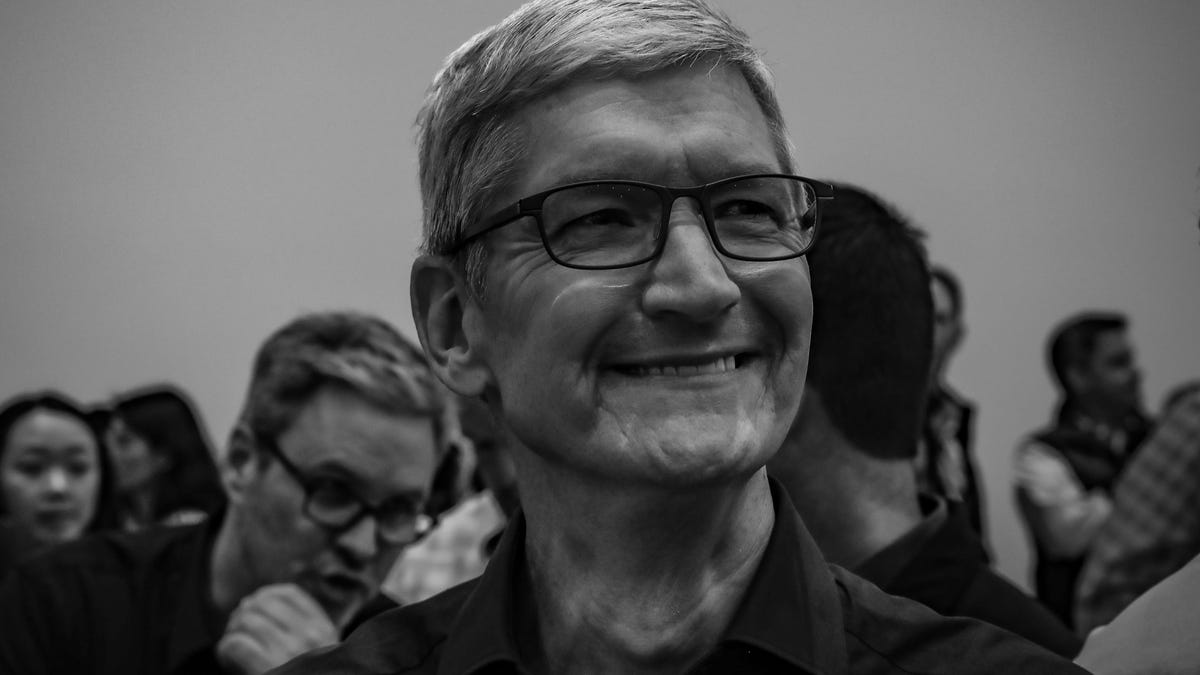Tim Cook says some tech regulation likely needs to happen
In an interview with Vice News Tonight on HBO, Apple's CEO also denies that storing customer data in China makes it easier for the Chinese government to access the info.

Apple CEO Tim Cook says privacy is "one of the most important issues of the 21st century."
There's more information on our phones than in our homes, Apple CEO Tim Cook said, and we may need government regulations to protect our privacy.
Cook, long a vocal proponent of user privacy, noted that our phones know about our relationships, what we look at online and what photos we take. All of that could be at risk if the data isn't properly protected.
"I see privacy as one of the most important issues of the 21st century," Cook said Tuesday during an episode of Vice News Tonight on HBO. "I'm not a pro-regulation kind of person, I believe in the free market deeply [but] when the free market doesn't produce a result that's great for society, you have to ask yourself: What do we need to do? And I think some level of government regulation is important to come out of that."
But getting members of Congress to understand technology and privacy enough to regulate them is "a challenge," he said.
"I think there is a need to work with Congress and the staff to make sure that we do our jobs of helping them kind of come up to speed ... on what's possible," Cook said, according to a transcript provided by Vice. "I'm exceedingly optimistic that this subject is now in the vocabulary and getting discussed. And now we've got to all figure out a way to take it to the next level, and change some things."
Cook, who joined Apple in 1998 to run operations, was Steve Jobs' hand-picked successor. He took over the top role for good in 2011, and since then, Apple has become one of the most powerful companies in the world. During his time as CEO, Cook has worked to broaden Apple's operations beyond the iPhone, but about two-thirds of the company's revenue still comes from the popular smartphone.
Over the past couple of years, he's made privacy and security a key focus for Apple. The company fought a high-profile battle with the US Justice Department to avoid having to build new tools to unlock iPhones. And it's continuously built new features into its software to make sure user data remains secure. The company makes its money by selling pricey phones, tablets, computers and other hardware, not by selling user data to marketers.
Some market watchers, though, have worried Apple's stance on keeping data on users' phones is hobbling the company's Siri voice assistant. Rival Google and others collect more data about usage, which is believed to make those assistants smarter. Cook disputed that belief in the Tuesday Vice episode.
"The narrative that some companies will try to get you to believe is, 'I've got to take all of your data to make my service better.'" Cook said. "Well, don't believe that. Whoever's telling you that -- it's a bunch of bonk."
Cook also denied claims that the Chinese government has an easier time accessing Chinese customer information because of a requirement that Chinese user data be stored on servers in that country. He noted that data is encrypted, and if an iPhone is locked in China, it can't even be opened by Apple in the US.
"We don't design encryption for ... the US and do it differently everywhere else," Cook said. "It's the same ... I wouldn't get caught up in the, 'Where's the location of it?' I mean, we have servers located in many different countries in the world. They are not easier to get data from being in one country versus the next."
As for the decision to permanently ban Alex Jones from Apple's App Store, Cook declined to explain the particular motivation behind that move but said it points to the importance of human curation. And he said there was no discussion or coordination with other companies like Facebook and Twitter, which also banned Jones.
Jones is the fiery right-wing broadcaster who's claimed, among other things, that the Sept. 11 attacks were an inside job, that the mass shooting at Sandy Hook Elementary School was an anti-gun hoax and that Hillary Clinton was involved in a child sex ring run out of a Washington, DC, pizzeria.
"We think that what the user wants is someone that does review these apps, someone that does review the podcasts, someone that [does that] like on Apple News, where a human is selecting the top stories," Cook said. "And that's what we do. We don't take a political stand. We're not leaning one way or the other."
NASA turns 60: The space agency has taken humanity farther than anyone else, and it has plans to go further.
Taking It to Extremes: Mix insane situations -- erupting volcanoes, nuclear meltdowns, 30-foot waves -- with everyday tech. Here's what happens.

